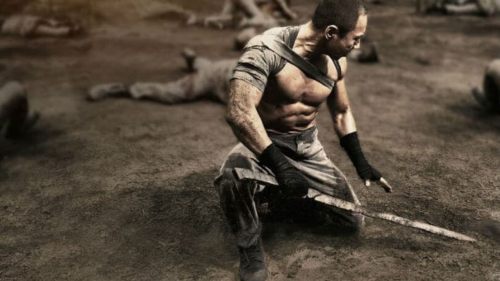ALTERED CARBON Season 2 Review: Cyberpunk Made Personal
It took two years, but Netflix’s sci-fi series Altered Carbon finally returned for a second season. Like a cyberpunk Doctor Who, it used its premise - a future in which people’s minds can be rehoused in new bodies via implants called “stacks” - to recast its lead actor and shake itself up a little. It’s also shunted the narrative thirty years ahead onto a different planet ("Harlan's World," founded by somebody with no shortage of ego). I'm into this seasonal anthology idea - even if it lacks a hero as effervescent as the Doctor.
While the first season was a fairly straightforward adaptation of the Richard Morgan book upon which it was based, the second blends together elements from Morgan's two sequels, plus some new elements original to TV. The new season sees protagonist Takeshi Kovacs resleeved into a brand-new military augmented body (Anthony Mackie, a performance upgrade onscreen as well as in the field) and thrust into a mystery involving the assassinations of nigh-immortal one-percenters known as Meths (short for Methuselahs). And it looks like his former flame Quellcrist Falconer (Renee Elise Goldsberry) is behind them.
One of the show’s biggest differences to the novels concerns Kovacs’ origin story as an “Envoy”. In the books, the Envoys are specially-trained agents of the military Protectorate. In the show, Kovacs is still ex-Protectorate, but the Envoys are rebels trained by stack inventor and anti-stack activist Falconer. This gives Kovacs a little more audience buy-in (it’s easier to sympathise with a rebel than an enforcer) and a richer, more vulnerable backstory. That’s important in this season, as Falconer's return and apparently altered personality spark conflicted emotions in Kovacs. The murder mystery isn’t enormously interesting, but the story it enables - about love, revenge, memory, identity, regret, and colonialism - is.
The core conceit of Altered Carbon is one that just keeps on giving. Above and beyond last season’s trips into immortality, virtual reality, and body expendability, season two explores memory implants, hot-swappable synth bodies, the death-restoration movement, cloning, and “double-sleeving” - copying the same consciousness into multiple bodies. That last item is a major plot point, as a centuries-old backup Kovacs is brought back, in a clone of his original body (Will Yun Lee, nailing his character arc), to kill his present-day self. Shades of Gemini Man, perhaps, but it's more meaningful here, as this Kovacs is literally the same person who eventually became the protagonist of this show. Kovacs justifying his actions to the younger version of himself brings up questions of how much we can or can’t change - and what our younger selves might think of what we turn into as we age. It's big philosophical stuff, and though it's filtered through sci-fi/action presentation, it works.
Last season’s breakout character, an AI assistant modeled after Edgar Allen Poe, receives an increased amount of screentime this year. After decades of service to Kovacs, Poe’s memory banks are failing due to data corruption, and his desperate attempts to cling to his sense of self manifest heartbreakingly like a sort of digital Alzheimer's disease. With fellow AI Miss Dig (Dina Shihabi) as a foil, Poe’s descent into self-doubt and existential terror is an emotional highlight. But though actor Chris Conner does reliably endearing work, and Poe’s plight links up thematically with Kovacs’ and Falconer’s own tales of lost identity, the storyline feels unfairly superfluous, taking place almost entirely outside the overall arc of the season. The world of Altered Carbon AI is fascinating; it just feels, at times, like its own distinct show.
Similarly awkwardly-positioned are new main-cast member Trepp (Simone Missick) and her family. Everything’s in place for these characters to be compelling additions. Missick's wired-in bounty hunter is well-drawn, with her own motivations distinct from Kovacs’ - a running theme amongst the show’s female characters, even morally-grey villain Danica Harlan, no doubt thanks to a majority-female creative staff. Trepp hunts bounties and runs a bar with her wife (it's not stated, nor does it matter, whether these are their original sleeves or genders), and cares for a son riddled with PTSD due to being resleeved after stepping on a mine. She could sustain a show on her own - which is great, but like Poe, it means she feels like a second protagonist thrust into somebody else's show.
By the season’s end, the story progresses to include the ancient aliens that originally built Harlan's World, bringing up issues of space colonialism and even environmentalism. The familiar SF concept of humans discovering and using ancient technology is flipped on its head here, shown to be the cultural appropriation it honestly kinda is. If the season is guilty of any crime in particular, it’s that this idea isn’t explored deeply enough. The alien presence is painted a little too cartoonishly, the issue resolved a little too easily for the human participants. I don't know if it'll be covered onscreen, but I hope the Elders return to take back their trees.
Through all of this, Altered Carbon remains committedly R-rated and hyperviolent, in all the ways its enormous budget allows. People are shot, broken, stabbed, and slashed; a particularly memorable sequence sees a whole squad of troopers burned alive by alien laser beams. It's still the neon-drenched cyberpunk tale it was last season. But its story is more focused on its characters and their psychology, which unlike the violence and budget only reveals itself through multiple episodes. After being a loner in the first season, Kovacs has prior connections to most of the principal players this time around: Falconer, his original commanding officer Jaeger, even Harlan’s World itself. As an illustration: when Kovacs is sentenced to execution by arena combat, he’s not fighting random executioners, but fighters equipped with the sleeves and memories of those closest to him, adding insult to injury. The action remains intense; it’s just got more meaning.
I don’t know if Altered Carbon will get a third season, though Netflix has announced at least one spinoff. There’s still territory to be mined from this show, certainly; the season finale closes the book on Kovacs, sort of, but leaves multiple openings for continuation. Should it progress, I’d be shocked if the show didn’t explore a large-scale rebellion storyline. As it is, it’s a bit of an oddball addition to the Netflix slate. Both seasons reach dizzying heights, but take a few episodes to spin up (a killer in the attention-hungry streaming world). It’s a smart sci-fi concept with increasing emotional depth, often told with thuddingly dumb “gritty” dialogue. And it’s yet another hyper-expensive Netflix show with a puzzlingly niche appeal. But who knows with Netflix? In many ways, it's a miracle this show got made in the first place.



